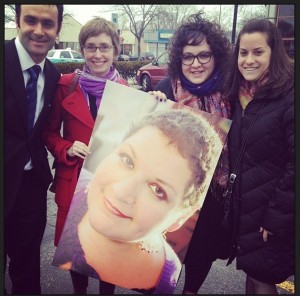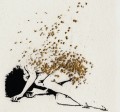Life and Action

Courtesy of Emily Goodstein
“Elissa made me promise that if we found ourselves planning an event in her memory, that it would be focused on the causes she cared about and not the disease that she happened to have.”-Emily Goodstein
Two Tributes to a Social Justice Hero: Elissa Froman (1983-2013)
“She was more than a colleague and friend — she was our conscience.” Zeek presents two celebrations of Elissa Froman, from best friend Emily Pearl Goodstein and NCJW colleague and friend Sammie Moshenberg. Both are adapted from March 24 eulogies for Elissa, who passed away on Friday, March 22, at 29.
From Farm to (Seder) Plate: Supporting a New Crop of Modern-day Isaiahs
Six months ago, my relationship with tomatoes changed forever. Once, they were simply the most delectable part of a salad. Now, I can’t bear to look at one without thinking about the hands that picked it. That’s why there will be a tomato on my family’s Seder plate this Passover. And I won’t be alone. Thousands of Jews across North America will be putting a tomato on their Seder plates, a symbol of the worker who picked it and the campaign to end slavery in the Florida tomato industry. This is our collective way of fulfilling the famous promise found in the Hagaddah, “It is because of what God did for me when I went free from Egypt.”
What happened six months ago? One morning just before daybreak, I found myself huddled with a group of five rabbis in a dimly lit parking lot in Immokalee, FL.
Jewish Youth Activism: A Model for Leadership Development?
The Jewish community needs innovative responses and approaches to foster engagement in our future. In order to create leaders who create Jewish experiences rather than merely consume them, we need to engage youth around Jewish issues that have meaning and purpose.
Jewish Education for a Time of Wandering
If we are not guided by a philosophy of Jewish education—a big picture idea of the aims of education and the best strategies to achieve those aims—much of our day-to-day work is wasted (at best) or counterproductive (at worst).
Shever v'Tikkun/Shattering and Repair: Lessons from the Journey of Aging
In the journey of aging, shatterings are rampant, inevitable, and recurrent. We will all face them.
Do We Still Need Jewish Feminism?
Within the United States, egalitarianism has become the baseline practice for the majority of American Jews. While the salaries and status of women Jewish professionals still lags below those of men, in the specifically religious arena, Jewish-American feminists have seen our most extraordinary dreams fulfilled. Do we still need Jewish feminism?
In Which I Discover LA is not NYC
A longtime Jewish New Yorker expands her horizons. Excerpted from Zeek’s new Spring/Summer 2011 print issue, focused on Los Angeles. Join us May 12 for the launch party in LA!
Reflections After New Orleans: What Makes A Liberal?
Queer Jewish Community Remixed: Organizing without a Critical Mass
At the intersection of queer and Jewish, how can LGBT Jewish students build a movement to empower themselves?
The End of Civil Discourse
Recently, I read a status update from an intelligent person who asked all of their friends who disagreed on their assessment of Israel as a terrorist state to hit the de-friend button. Is this really what we’ve come to?
Beyond Good Intentions: A Values Proposition for Jewish Service-Learning
For an investment of $1,800, we’re delivering about $150 worth of manual labor to a poor community in the developing world. Why is what we are doing not “poverty tourism”?
Home and Work, Community and Advocacy
“Do not choose between family and social change work. Rather, it is a loving community that enables us to sustain our commitment to a more just world.”
Why Did the Jew Cross the Road?
Organizing Jews to do what is right, not what is easy.
On Orthodoxy, and Editing
A hello from Zeek’s new Online Editor, Rivka Fogel, discussing her experience as an Orthodox Jewish editor. Some musings on the discussions between Orthodoxy and non-Orthodoxy, and within Orthodoxy itself.
Social Justice Movements: The Good They Do (Through the Stories They Tell)
Rabbi Sid Schwarz responds to Jay Michaelson’s article, which puts forth the theory that social justice problems are projected and not fixable.
Story is the Peril of Service
Jay Michaelson reexamines the roots of problems that social justice movements work to fix.
Don't Meet Them Where They Are
Zeek editor Jo Ellen Green Kaiser argues that the recent trend of catering to the wants of potential activists—particularly by focusing justice work so heavily on the food movement—is a misguided waste of time and effort.
Cool Jews!
Angela Himsel points out the disproportionate amount of Jewish intellectuals, and ponders bigotry and assumptions.
How to Build Just and Holy Congregations
Unfortunately, too many synagogues are filled with napkin-holder smashers. Even those congregations and rabbis, who, like myself, are strongly committed to the pursuit of justice, often miss the mark. We mistake a Mitzvah Day or a fiery sermon for the work of repairing the world. We take actions that make us feel good about our identities as justice-seeking Jews, but that do little to effect change.
![[the current issue of ZEEK]](../../../image/2/100/0/5/uploads/leftistethicistgraphic-52842c6a.png)
- 5000 Pages of Zeek
- Founded in 2001, Zeek was the first Jewish online magazine, and we have over 5000 pages online to prove it, all available free of charge. Read more in the Archive.







